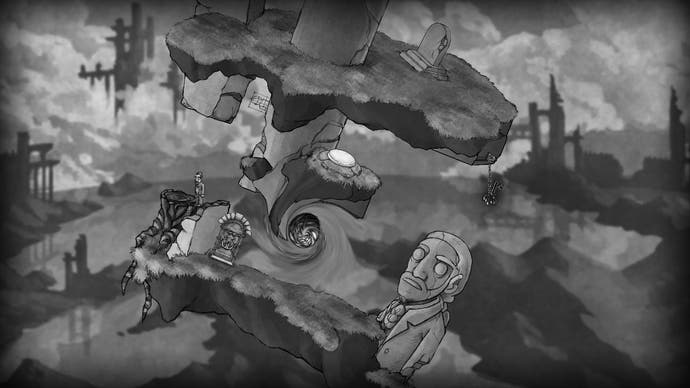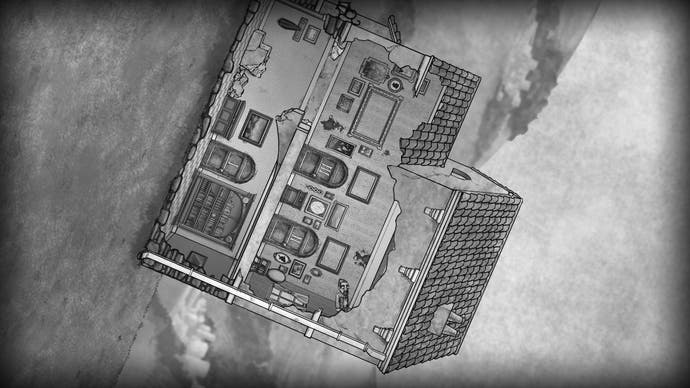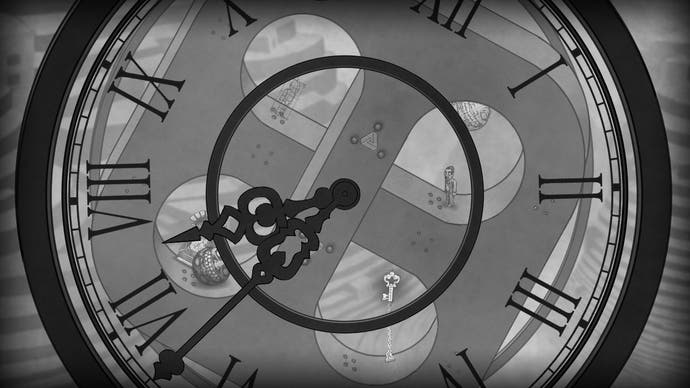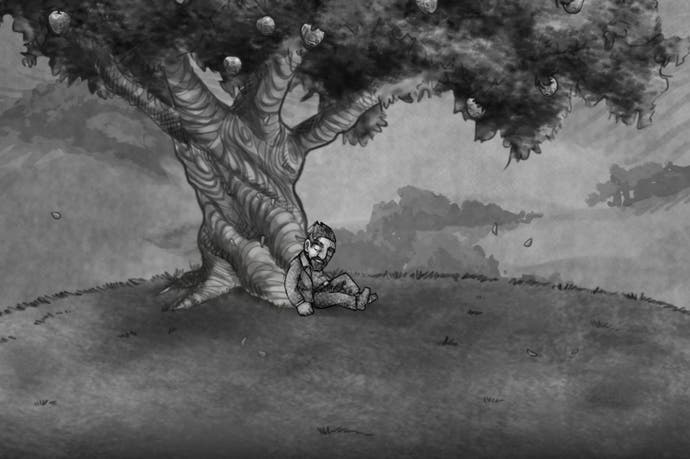The Bridge review
Let's twist again.
The cloying grasp of formula doesn't just tangle up the big bloaty blockbusters at the high profile end of the gaming spectrum. Even humble indies can be just as susceptible to cliché, as this charming but slight physics puzzler demonstrates. Originally developed as a student project in 2011, but only now finding commercial release, The Bridge is clearly a game created in the shadow of Braid.
Just as indie movies showcase their free-spirited credentials with scratchy "hand drawn" posters and opening titles, so The Bridge adopts a black and white pencil sketch aesthetic that flickers and twitches with each frame. It's eye-catching and nicely presented, but also predictable - as if someone had set the graphics dial to a default "indie game" setting.
The game opens with snores. They're coming from our mysterious hero, a bookish fellow who has fallen asleep under an apple tree. Straight away we're introduced to the game's key mechanic: the ability to tilt the world. After rocking the scenery back and forth a few times, an obligingly Newtonian apple hits our hero on the head and wakes him up. From there, he's guided to his house where three doorways await. Behind each door lies a corridor containing six further doors, each leading to a level.

The levels themselves are self-contained, single-screen affairs where the aim is to get your man to the exit door. He can walk left and right but not jump, so it's up to you to rotate the scenery in his favour. This task is quickly complicated - first by giant boulders that crash, roll and fall as the level tilts, and later by such features as vortices that ensnare any moving objects, chambers that flip gravity upside down and "veils" that allow your character to remain stationary while everything else moves. Should you make a mistake or die, you can rewind time - the game's most obvious debt to Braid - leaving behind a ghostly shadow where you perished.
There are also keys to collect, as the exit is sometimes blocked by padlocks, and these keys can be attached to chains, making them dangle frustratingly out of reach as the world turns. Further wrinkles are introduced later on as inverting the gravity of a level switches your man between his standard grey self and an all-white alter ego. The same change applies to keys and other elements, so careful planning is needed to make sure you reach each object when in the correct state.
Or, rather, careful planning is sometimes required. One of The Bridge's biggest failings is how hurried it feels. With only six stages per world, the first two or three of which are always taken up with simple tutorials for new features, there are only a handful of puzzles in the whole game that really feel designed to test your mental prowess. Of these, many can still be solved by accident while rotating the world at random to see what happens. Few levels attain the sort of mind-melting difficulty that typifies the cream of the puzzle game crop, and even the ones that are tricky enough to slow you down generally give up their secrets with the minimum of fuss. With only two directions of movement to play with, solutions generally present themselves sooner rather than later.

The core rotate-and-invert concept is solid, but there's a timidity to the execution that leaves it feeling a little like one of those rudimentary puzzles you get in a Christmas cracker. A bit of distracted tinkering is too often all the effort that's needed and it's entirely possible that you'll polish off the game's initial offering in just a few hours.
Brevity is no sin on its own, of course, but The Bridge constantly feels like a game that needs to slow down and explore its own ideas more thoroughly. Each world is over so quickly that concepts are dangled and then snatched away just as they're becoming interesting. The end of the game offers a small compensation in the shape of Mirror World, where you can replay the same stages with different puzzle elements, and there are hidden "wisps" to find, but it's not quite enough to dispel the feeling that The Birdge is merely the taster course for a more satisfying meal kept frustratingly off the menu.
It's especially disappointing since the flashes of brilliance that the later stages display suggest that there's a truly great puzzle game in here, if only the structure was broad enough to let it bloom naturally. The physics are a little sluggish - rotation speeds could stand to be smoother, and even with his limited horizontal movement our human hero is distractingly graceless - but it's nothing that will hold you back from enjoying the simple cause-and-effect loop that comes from tipping the world upside down and seeing what shakes loose.

The game's attempts at profundity also fall a bit flat, with sporadic cryptic captions doing a poor job of telling a story, abstract or otherwise. It's here that Braid's shadow falls darkest, as the end of each level offers up obtuse little phrases that trigger as you walk past. In Braid, the tone and mood tipped you off to the romantic melancholy being explored and its flowery pockets of prose fell into place as you journeyed deeper inside its world. The Bridge, in contrast, struggles to tie its arty flourishes together. The game feels arch and pretentious, not because it has any truths worth obscuring, but because that's what indie games are supposed to be like.
And that's a problem which proves insurmountable for what is, at best, a decent puzzle game that's only occasionally as ingenious as it needs to be. With obvious debts to such indie hits as Braid, Limbo and The Misadventures of P.B. Winterbottom, The Bridge ultimately feels like a truncated compilation of iconic motifs rather than a fully-fledged experience in its own right. If it were deeper, more substantial or just more confident in exploring its ideas, then The Bridge might have earned a place alongside the titles it idolises rather than following in their shadow.

